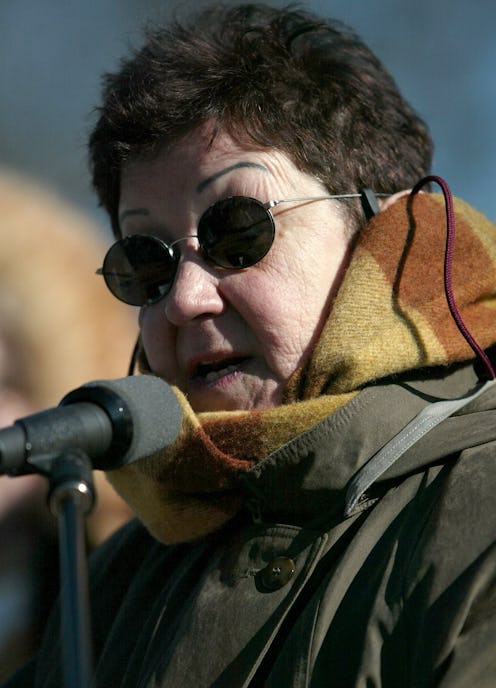News
The Unknown Life Of Jane Roe

After years of living in anonymity, Jane Roe — who was at the center of the 1973 landmark abortion decision, Roe v. Wade — broke her silence on national television in the 1980s. Suddenly, Jane Roe became Norma McCorvey, the real-life woman who was one of the most famous plaintiffs in history. But though many know the ins and outs of the case that came to define her life, few people know the complicated and unexpected turns in the story of McCorvey, the woman behind it all, who died on Saturday at 69.
McCorvey's rise to national recognition — or at least her pseudonym's recognition — started simply enough. In September 1969, McCorvey wanted to terminate her third pregnancy (her other two had resulted in adoptions, one by her mother). Abortion wasn't legal in Texas, and she couldn't afford to travel to any of the six states — Alaska, California, Hawaii, New York, Oregon, Washington — where she could obtain an abortion.
At the advice of her doctor, who legally could not perform the procedure, McCorvey met with adoption agent Henry McCluskey. And it was McCluskey, knowing that an old friend was searching for a plaintiff, who introduced McCorvey to Sarah Weddington and Linda Coffee, the two young lawyers who were determined to sue the state of Texas (represented by Dallas County District Attorney Henry Wade) over its abortion laws. And so they sued. You already know the outcome: in January 1973, when the U.S. Supreme Court ruled on the case, abortion was legalized for women across the United States.
McCorvey, though, wouldn't "be the first girl in Texas to get a legal abortion," as she later wrote she had hoped to become. McCorvey carried her pregnancy to term, gave birth, and put the child up for adoption, not yet able to benefit from the law she helped create.
Her life was full of difficulties and contradictions, and her legacy is a complicated one. For example, McCorvey, by the end of her life, was a zealous anti-abortion advocate and born-again Christian. After years of working directly or tangentially with abortion rights — creating two foundations that took on her pseudonym — McCorvey did an abrupt about-face in 1995. She had begun dropping in on a faith-based group that had moved next door to the abortion clinic she worked at. Their mission? To make abortion illegal.
Although just a year before, she had published I Am Roe: My Life, Roe v. Wade and Freedom of Choice — instructive in the title alone — within months McCorvey had quit her job at the clinic, shuttered her abortion foundations, and gotten baptized. Anti-choice advocates, who were elated that the high-profile plaintiff had publicly joined their team, readily accepted her. She created a Roe No More Ministry, which aimed to upend her legacy. For the rest of her life, McCorvey would steadily work to make abortion illegal again. In 1997, she published Won by Love, chronicling her journey of the jump between the pro-choice and anti-choice posters.
Her belief in abortion rights wasn't the only casualty of her turn to Christianity (and eventually Roman Catholicism). McCorvey had been living with her partner Connie Gonzalez, who she met right after the case was decided. A 1994 New York Times article depicts a peaceful domestic life for the two women, despite a highly publicized shooting attempt from presumed anti-choice activists that, years later, Gonzalez would deny.
She continued to live with Gonzalez after that, but would introduce her as a cousin, an aunt, or her godmother (Gonzalez was seventeen years her senior). In 1996, McCorvey told the Washington Times that her relationship with Gonzalez had become platonic, adding that "I am not a lesbian. I'm just a child in Christ now." After Gonzalez suffered a stroke in 2005, McCorvey, who had continued to live with her as her she leveraged more high-profile appearances as a Christian anti-choice advocate, left her.
So when McCorvey, once a pro-choice icon and openly gay woman, died in Katy, Texas on Saturday, she went out of this world almost the complete opposite. It isn't, perhaps, what anyone expected from her when she owned her anonymous role. But, whatever she thought about the legal legacy she left behind, though Norma McCorvey is now gone, Jane Roe still remains.